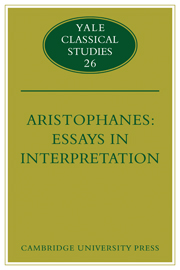Aristophanes as a lyric poet
Published online by Cambridge University Press: 10 January 2011
Summary
Of the many extraordinary features of Aristophanic comedy, none is more extraordinary than its lyrics – especially, I am tempted to add, if one includes under that heading some of the comments that the lyrics themselves have engendered. The present essay has three main objects: to oppose what seems to be a general notion of Aristophanes as a writer of ‘serious’ lyric poetry; to clarify the conceptual basis of this notion; and to offer a reinterpretation of his actual achievement as a lyric poet.
The general view is easily stated. In the first place, Aristophanes is ‘a master of lyric poetry in every vein, humorous, solemn, or delicate’ (Dover). And in particular, his lyrics ‘frequently rise to the level of authentic high poetry’ (Rau). The fact is that he has an ‘enchanting, airy manner, which is among the glories of Greek lyric poetry’ (Bowra). Hence his lyrics can be spoken of in the same breath as the poems of Pindar and Keats (Stanford); or, not to mince words, ‘some of the finest Greek lyrics – and that is to say some of the finest lyrics produced by the human genius – are found in his plays' (Harsh). Such statements tend to be supported by disappointingly little in the way of analysis or comparison or indeed argument of any kind, but their authors indicate sufficiently clearly their agreement on which particular lyrics and which kinds of lyric in general they have in mind.
- Type
- Chapter
- Information
- Aristophanes: Essays in Interpretation , pp. 99 - 152Publisher: Cambridge University PressPrint publication year: 1981
- 3
- Cited by



